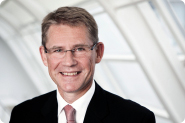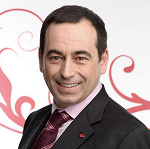A lot has changed in the Russian economy in the two years since Denmark's Novo Nordisk ($NVO) started work on its $100 million insulin plant there. But with the plant's opening Friday, Novo emphasized that it is taking the long view on a market that is much less promising than it was a few years ago.
 |
| Novo CEO Lars Rebien Sørensen |
"The manufacturing facility in Kaluga is a sign of our long-term commitment to people with diabetes in Russia, where close to 10 million people have the disease according to local studies," Novo CEO Lars Rebien Sørensen said in an April 10 statement. "With our investment in local manufacturing, we ensure availability of high-quality modern insulins to the people with diabetes in Russia who rely on our products every day."
The plant is in Technopark Grabtsevo in the Kaluga region of Russia about 180 kilometers southwest of Moscow. Novo says it is the "first and only greenfield facility" in Russia for making modern insulin. A company spokeswoman said the plant will have 100 to 150 employees. She also pointed out that Russia currently accounts for only about 1% of the company's business.
Asked about the outlook for Novo in Russia earlier this year, Jakob Riis, Novo's head of marketing, medical affairs and stakeholder engagement, waved off the idea that a falloff in the economy would derail Novo's plans there. "Russia is not a mess," he said.
But it is certainly a less tidy market than it was when Novo started planning the facility in 2010. At that point, Russia's economy was flush with oil profits, and the middle class was growing, prompting lots of pharma players to view it as a good bet to offset slower growth in more developed markets. Many started thinking about local production, because President Putin made clear that those who didn't would be looked on less favorably.
In the past year, however, Russia's economy has been squeezed hard, both by falling oil prices and by three rounds of financial sanctions the West has imposed for Russia's involvement in fighting in Ukraine. According to the New York Times, wages in the country are off sharply and the average income in Moscow this year is forecast to run $900 a month, down from a peak of $1,700 in 2013.
The problems in Russia last year led Germany's Fresenius to cancel its plans to create a partnership with Russia's Binnopharm, which would have given it access to two manufacturing facilities that make IV drugs and infusion solutions as well as APIs. It announced in November that "Changing political and regulatory circumstances in the region have made the closing of the joint venture more challenging than anticipated." It said the two companies would look at other ways to work together.
 |
| Russian billionaire Roman Avdeev--Courtesy of Roman Avdeev |
Still others, like Novo, are betting on the long term in Russia. Abbott Laboratories ($ABT) agreed late last year to pay 16.7 billion rubles ($305 million) to Russian billionaire Roman Avdeev to get drugmaker Veropharm. Abbott, which has been doing business in Russia for 40 years, said the deal would give it a "manufacturing footprint in Russia" that will include a brand-new plant that has yet to open. Abbott has predicted that the new operation would add $150 million in sales to the company in 2015.
- here's the announcement
- get more from the New York Times